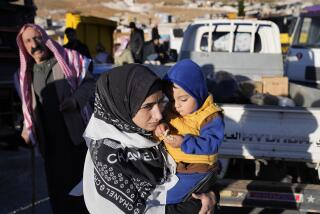Lebanon Lawmakers to Meet in Peace Bid
BEIRUT — Largely powerless Christian and Muslim members of Lebanon’s Parliament will gather today at a resort in Saudi Arabia for talks aimed at bringing peace to their beleaguered country.
The meeting, sponsored by Arab League mediators, is given almost no chance of resolving the conflict, but it has produced a week of truce, the longest in more than six months of shelling between Christian gunners and Syrian-supported Muslim forces here.
Throughout the day Friday, the legislators left Beirut by air for the Saudi summer resort of Taif. Each faction left from its own side of the divided capital: Muslim deputies departed from the newly reopened Beirut International Airport, while the Christians traveled by helicopter to Larnaca, Cyprus, where they caught connecting flights.
A Full Agenda
On the table at Taif will be an Arab League proposal for political reform, election of a new Lebanese president, establishment of a reconciliation government and eventual withdrawal of Syrian forces from Lebanon.
But the political divisions of 14 years of civil war made for hard-line positions even before the deputies left.
Salim Hoss, who heads a Muslim cabinet in West Beirut, charged that his Christian counterpart, Maj. Gen. Michel Aoun, had already spoiled the meeting’s prospects by demanding that a Syrian troop withdrawal precede any talk of political reform.
“We regret the negative stands adopted by Gen. Aoun on the eve of the meeting,” the Beirut newspaper An Nahar quoted Hoss as saying. “He (Aoun) said that he will not accept to lose by politics what he had succeeded in preserving by cannon.”
The artillery war began last march when Aoun, commander of the Christian-dominated Lebanese army and head of a rival Christian cabinet in East Beirut, imposed a blockade on illegal Muslim ports that were draining government tax revenues and bringing arms to his enemies.
Muslim Gunners Retaliated
Druze militiamen responded with artillery fire against Christian positions, and were soon joined by the gunners of the 40,000-man army Syria has deployed in Lebanon. Aoun countered by declaring a “war of liberation” against the Syrian forces.
More than 800 people have been killed and 4,000 wounded in the six months of relentless shelling that halted a week ago with Aoun’s acceptance of the cease-fire arranged by the Arab League.
Political analysts here said Friday that the most that could be expected of the Taif talks is a return to the situation that existed before Aoun’s liberation campaign began March 14--a divided Lebanon with rival Christian and Muslim governments and a fragile peace.
The Arab League plan will be discussed by fewer than 60 of the surviving members of Lebanon’s Parliament, according to the analysts’ estimates. In all, 99 members were elected in 1972, in the last national elections. Civil war broke out three years after the voting.
The others have refused to go to Taif, either for political or health reasons. Most of the men are now in their 70s.
The talks are being held abroad in order to eliminate physical coercion, which has prevented parliamentary sessions in Lebanon in recent years.
Troop Withdrawal a Key Issue
The Christian deputies, who met with Aoun on Wednesday to formulate their strategy for the talks, will go to Taif with a “political ceiling,” An Nahar reported Friday. At the top of their list, the report said, is withdrawal of non-Lebanese forces, “specifically the Syrian army.”
Syrian officials have said their forces will remain in Lebanon at least until Israeli troops are withdrawn from a self-declared security zone they patrol in the south.
Syrian Vice President Abdel-Halim Khaddam earlier this week added a political condition, declaring that no Syrian soldier will be withdrawn until a unity government is established in Lebanon and reforms are introduced to change the “confessional system” that allots top government posts on the basis of religion, with the Christians receiving the presidency and command of the army.
The Arab League proposal would not abandon confessionalism, but would restructure government powers, decreasing the influence of a Christian president in favor of a Muslim prime minister.
More to Read
Sign up for Essential California
The most important California stories and recommendations in your inbox every morning.
You may occasionally receive promotional content from the Los Angeles Times.










